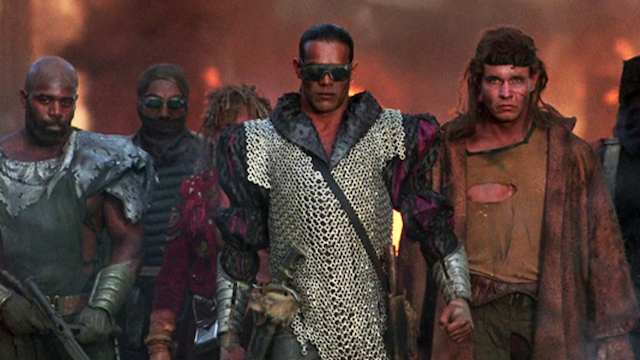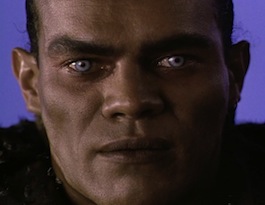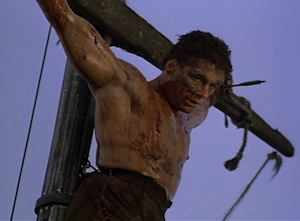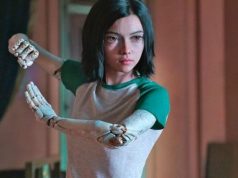
What’s that you say? You’ve got a brutally violent movie called “Cyborg” that stars famed oily Belgian Jean-Claude Van Damme? Count me in! I’d love to see Van Damme play a cyborg! Oh, he’s not the cyborg? Well, I’d love to see him battle a cyborg! That would be cool too! Come again? The cyborg is neither the hero nor the villain but merely an ancillary character with about 90 seconds of screen time? And her name is Pearl? I politely decline your offer.
Eh, I guess we’re already committed, so here goes. Like 62% of all bad movies, “Cyborg” is set after the apocalypse. An ominous whispery voice tells us in narration that after the collapse of civilization and its attendant anarchy and starvation came the plague, aka The Living Death. The few scientists left alive are working on a cure, but our campy narrator is not in favor of that. “I like the death!” he declares. “I like the misery! I like this world!” Our narrator is a make-lemonade-out-of-lemons kind of guy. He sounds like an intriguing character! Is it Jean-Claude Van Damme??

Ugh, no. It’s a dude named Fender, played by a dude named Vincent Klyn, a professional surfer who somehow wandered into a couple of movies, including this one, sort of. Van Damme isn’t here yet. Fender is the leader of one of those post-apocalyptic gangs that dress in hilarious costumes and kill people for fun. They call themselves “pirates,” but instead of singing jaunty songs and engaging in ribald banter and firing cannonballs at ships, all they do is rape, pillage, and murder. Some “pirates” they are!
Fender and his merry band of comically outfitted sociopaths are in New York in pursuit of a woman named Pearl (Dayle Haddon), the aforementioned cyborg. She has the cure for plague in her possession and must get to Atlanta, where the country’s only remaining scientists are hanging out, either because they’re all that’s left of the Centers for Disease Control, or because they’re all that’s left of Tyler Perry’s top-secret laboratory that produces full-body fat suits and melodrama. In any event, Fender’s gang captures Pearl and forces her to take them with her to Atlanta so that they can stop the plague from being cured. But if Pearl HAS the cure, couldn’t they just kill her? And if some key components of the cure are in Atlanta, can’t they go to Atlanta on their own? What do they need Pearl for? It’s not hard to get to Atlanta from New York. You take I-95 south until it meets I-85, just outside Richmond, Va., and then take I-85 straight to Atlanta. You can’t miss it.
Meanwhile, remember how Jean-Claude Van Damme is in this movie? Well, he is. He plays Gibson, a mercenary who was Pearl’s bodyguard for about five seconds, until Fender knocked him out and kidnapped her. Instead of responding to his embarrassment honorably by committing ritual seppuku, Gibson pursues the pirates. Along the way, he meets a chesty gal whose name the movie doesn’t mention but IMDb says it’s Nady, so we’ll go with that. Nady (Deborah Richter) politely takes off her clothes and offers to have sex with Gibson, but now that Gibson has already botched his mission once, he’s REALLY focused on it. No sex for him! Nady should consider herself lucky, since doing it with Van Damme is probably like doing it with a seal, all slippery and shiny and inarticulate.
Gibson is tormented by flashbacks to an earlier time, when he settled down in a country house with a hillbilly girl named Mary and her two siblings, only to see Fender kill Mary and one of the kids and take the other one hostage. Basically, what we are learning about Gibson is that he has never successfully protected anyone from anything.
Gibson and Nady run into a lot of bad guys on the way to Atlanta. That means there is a lot of fighting, as fighting is the one thing that the star of this movie is reasonably good at. Gibson has a gun, but he prefers to fight hand-to-hand. And what he mostly likes, really, is kicking people. He LOVES kicking people! It’s his favorite thing. You put him up against a band of villains trained in the martial arts and he will throw down his gun and kick every single one of those S.O.B.’s. until they are unconscious, or at least lying on the ground, kicked.
But his kicking skills fail him when he encounters Fender and — what do you know — loses to him, again, as is his custom. The two things Gibson is best at are kicking people and being humiliated by Fender. Fender should probably just kill Gibson, but what kind of movie villain would he be if he actually did the thing he claimed he wanted to do? No, standard procedure once you’ve captured the hero is to put him into a situation where he’ll probably die, then leave him unattended so that you can be shocked later on when he escapes.

Fender’s choice is to have his men crucify Gibson, a method of punishment fraught with symbolism, as I’m sure you’re aware. Is Gibson meant to be some kind of “Savior” figure? That would be a bit of a stretch for a character whose main attribute so far is being unable to save himself or anyone else. Then again, Gibson does one-up his most famous crucifixion predecessor by escaping from the cross, which he does in a manner befitting the rest of the film, i.e., with a lot of gore and grunting.
It all comes down to an epic battle between Gibson and Fender (who, yes, are both named after guitars, for no reason). Fender has very pale blue eyes that the movie keeps showing in close-up, I guess because the movie thinks they’re … scary? Creepy? Pretty? I don’t know. When we’re not seeing his eyes, we’re seeing him and Gibson kick the crap out of each other, accompanied by much monster-like roaring, the screenwriter having been made aware that neither actor is very handy with actual words.
Eventually, Pearl the cyborg, making a cameo appearance in the movie named after her, gets to Atlanta with the plague cure, accompanied by a finally-somewhat-helpful Gibson. Pearl tells her scientist friends that while she has the serum, “I feel like [Gibson] is the real cure for the world.” The only way this statement makes any sense is if it comes at the end of a different movie, one where the hero has proven to be noble, valiant, or even competent. “Rudy,” for example. You could argue that the world would be a lot better off if everyone were more like Rudy. Gibson, not so much. And besides, if he’s so awesome and he’s the real cure for the world, why isn’t the movie called “Passion of the Gibson” or “The Last Temptation of Gibson” or something? I rest my case.
— Film.com





